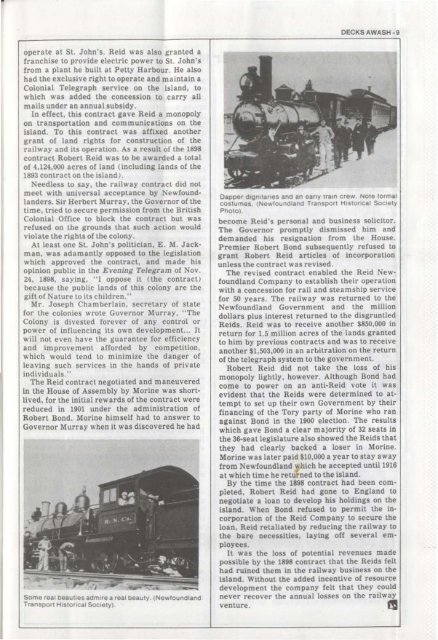OlCKSavvash - Memorial University of Newfoundland
OlCKSavvash - Memorial University of Newfoundland
OlCKSavvash - Memorial University of Newfoundland
You also want an ePaper? Increase the reach of your titles
YUMPU automatically turns print PDFs into web optimized ePapers that Google loves.
operate at St. John's. Reid was also granted a<br />
franchise to provide electric power to St. John's<br />
from a plant he buUt at Petty Harbour. He also<br />
had the exclusive right to operate and maintain a<br />
Colonial Telegraph service on the island, to<br />
which was added the concession to carryall<br />
mails under an annual subsidy.<br />
In effect, this contract gave Reid a monopoly<br />
on transportation and communications on the<br />
island. To this contract was affixed another<br />
grant <strong>of</strong> land rights for construction <strong>of</strong> the<br />
railway and its operation. As a result <strong>of</strong> the 1898<br />
contract Roben Reid was to be awarded a total<br />
<strong>of</strong> 4,124,000 acres <strong>of</strong> land (including lands <strong>of</strong> the<br />
1893 contract on the island).<br />
Needless to say, the railway contract did not<br />
meet with universal acceptance by <strong>Newfoundland</strong>ers.<br />
Sir Herbert Murray, the Governor <strong>of</strong> the<br />
time, tried to secure permission from the British<br />
Colonial Office to block the contract but was<br />
refused on the grounds that such action would<br />
violate the rights <strong>of</strong> the colony.<br />
At least onc St. John's politician, E. M. Jackman,<br />
was adamantly opposed to the legislation<br />
which approved the contract, and made his<br />
opinion public in the Evening Telegram <strong>of</strong> Nov.<br />
24, 1898, saying, "I oppose it (the contract)<br />
because the public lands or this colony are the<br />
gift <strong>of</strong> Nature to its children."<br />
Mr. Joseph Chamberlain, secretary or state<br />
for the colonies wrote Governor Murray, "The<br />
Colony is divested forever <strong>of</strong> any control or<br />
power <strong>of</strong> influencing its own development... It<br />
will not even have the guarantee for efficiency<br />
and improvement afforded by competition,<br />
which would tend to minimize the danger <strong>of</strong><br />
leaving such services in the hands <strong>of</strong> private<br />
individuals."<br />
The Reid contract negotiated and maneuvered<br />
in the House <strong>of</strong> Assembly by Morine was short·<br />
lived, for the initial rewards <strong>of</strong> the contract were<br />
reduced in 1901 under the administration <strong>of</strong><br />
Robert Bond. Morine himself had to answer to<br />
Governor Murray when it was discovered he had<br />
Some real beauties admire a real beauty. (<strong>Newfoundland</strong><br />
Transport Hlstoncal Society).<br />
DECKS AWASH·9<br />
Dapper dtgnltafles and an earlY train crew. Note lormal<br />
costumes. (<strong>Newfoundland</strong> Transporl Hlstoncal Soclely<br />
Photo).<br />
become Reid's personal and business solicitor.<br />
The Governor promptly dismissed him and<br />
demanded his resignation from the House.<br />
Premier Robert Bond subsequently refused to<br />
grant Robert Reid articles <strong>of</strong> incorporation<br />
unless the contract was revised.<br />
The revised contract enabled the Reid New·<br />
foundland Company to establish their operation<br />
with a concession for rail and steamship service<br />
for 50 years. The railway was returned to the<br />
<strong>Newfoundland</strong> Government and the million<br />
dollars plus Interest returned to the disgruntled<br />
Reids. Reid was to receive another $850,000 in<br />
return for 1.5 million acres <strong>of</strong> the lands granted<br />
to him by previous contracts and was to receive<br />
another $1,503,000 in an arbitration on the return<br />
<strong>of</strong> the telegraph system to the government.<br />
Robert Reid did not take the loss or his<br />
monopoly lightly, however. Although Bond had<br />
come to power on an anti·Reid vote it was<br />
evident that the Reids were determined to attempt<br />
to set up their own Government by their<br />
financing <strong>of</strong> the Tory party <strong>of</strong> Morine who ran<br />
against Bond in the 1900 election. The results<br />
which gave Bond a clear majority <strong>of</strong> 32 seats in<br />
the 36-seat legislature also showed the Reids that<br />
they had clearly backed a loser in Morine.<br />
Morine was later paid $10,000 a year to stay away<br />
from <strong>Newfoundland</strong> which he accepted until 1916<br />
at which time he returned to the island.<br />
By the time the 1898 contract had been completed,<br />
Robert Reid had gone to England to<br />
negotiate a loan to develop his holdings on the<br />
island. When Bond refused to permit the incorporation<br />
<strong>of</strong> the Reid Company to secure the<br />
loan, Reid retaliated by reducing the railway to<br />
the bare necessities, laying aU several employees.<br />
It was the loss <strong>of</strong> potential revenues made<br />
possible by the 1898 contract that the Reids felt<br />
had ruined them in the railway business on the<br />
island. Without the added incentive o( resource<br />
development the company felt that they could<br />
never recover the annual losses on the railway<br />
venture. t!

















